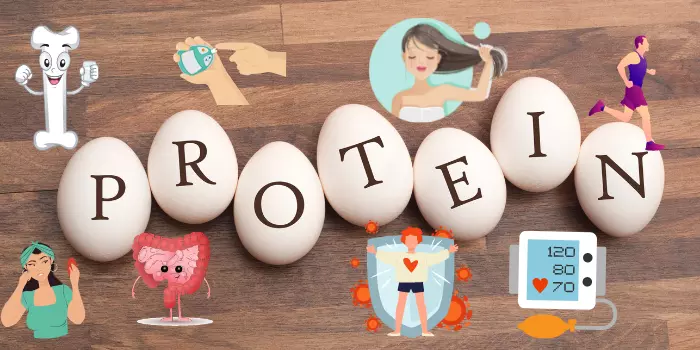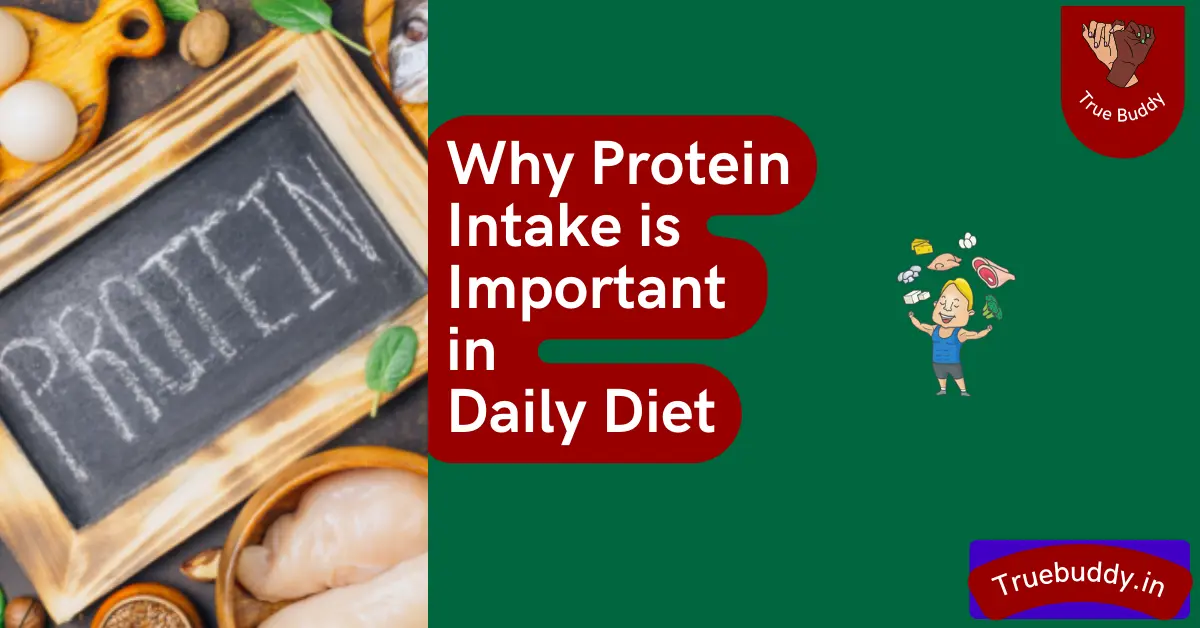Protein intake is very important in our daily diet as it is a major nutrient along with carbohydrates and fat. When it comes to maintaining good health, protein is the element whose name comes first. Be it your doctor or gym trainer, everyone advises taking protein for good health. Basically, proteins are the building blocks of our body. It plays an important role in keeping our cells healthy and in good shape. Protein is also called a macronutrient since it is required in large amounts for our body to stay healthy.
Functions of Protein in Our Body
To conduct various body activities ideally, we should have an adequate protein intake in our diet. Protein is everywhere in our body in our organs, skin, hair, red blood cells, muscles, brain, etc.
Let’s understand the importance of protein intake by knowing the various functions in our bodies.
- Build and Repair Muscles
The primary function of protein in our body is building and repairing muscles. Due to this reason, protein intake is prevalent among fitness lovers and gym-goers. Not only for fitness lovers, but the daily intake of protein is also essential for keeping the average person’s body fully functional. Thus, an essential building block of skin, cartilage, muscles, and skin protein makes an essential place in your daily diet.
- Helps in the Digestion
Half of the daily protein intake in your body helps make enzymes that digest the food and make body chemicals and new cells.
- Oxygenate
A protein compound is contained in red blood cells, which carries oxygen to the whole body, providing essential nutrients.
- Regulate
Protein helps regulate hormones and the development of cells in adolescence.
Why Protein Intake is Important?

i. Protein Intake Makes you Feel Fuller for Longer
Among the three essential macronutrients like protein, carbs, and fats, protein can make you feel less hungry for a more extended period. The reason is protein decreases the hunger hormone called ghrelin and increases the level of another hormone called a peptide, which reduces your hunger. If you want to consume protein for weight loss, you can replace your fats and carbs with protein-rich foods.
For example, you can reduce your regular portion of carbs like rice and replace it with protein like lean meat, fish, black beans, or legumes. Some of the best protein sources are lean meats like lamb, beef, chicken, fish like salmon, prawns, lobster, crabs. Eggs are also a good source of protein. The best sources of veg protein are all types of beans, lentils, green peas, tofu, pulses, oats, legumes, guava, chickpeas, nuts, avocados, seeds like pumpkin seeds, hemp seeds. Dairy products like milk, cheese, yogurt, cottage cheese are also rich in protein.
ii. Proteins are Great for Bone Health
A study found that protein plays an essential role in maintaining bone health. Regularly consuming a protein-rich diet helps maintain better bone mass in old age and prevents fractures and osteoporosis. Women should consume a good amount of protein as they have a high risk of osteoporosis as they get older.
However, another study revealed that excess animal protein might be bad for the bones as it leads to acid load in the body. To neutralize this acid, calcium is percolated from the bones to be harmful. The Dietary intake reference report for macronutrients states that protein consumed by a sedentary adult should be 0.8 grams of protein per kg of the body weight, which is 0.36 grams per pound.
So, for the average sedentary man daily intake of protein should be 56 grams, and for the average woman, it should be 46 grams. A balanced diet of protein, carbs, and fats is the best for your body. For example, if you need 2000 calories per day, the calorie intake from protein should be 200 to 700 calories. The key is to exercise more and burn calories to consume protein easily. But overeating protein-rich foods can lead to weight gain, so everything is good in moderation. Therefore, protein intake according to weight is the best.
iii. Protein Boosts Fat Burning and Increases Metabolism
Some calories from our food are used for metabolizing and digesting food after eating. This process is known as the thermic effect of food. Protein has the maximum thermic effect than carbohydrates and fats. So, a protein-rich diet aids in weight loss. For example, a high protein diet can help you burn as much as 80 to 100 calories per day. Thus, protein boosts metabolism and burns calories even during sleep. In a survey conducted, eating high amounts of protein contributed to 260 calories burnt per day.
Therefore, protein helps to boost metabolism, burn calories, and helps you to stay in shape. Besides, a protein-rich diet also makes you feel fuller, reducing the urge for binge eating and consuming lesser calories.
iv. Protein Intake Helps Lower Blood Pressure
According to a study, moderate consumption of protein, especially plant protein, helps lower blood pressure. Eating moderate amounts of seeds, nuts, beans, and peas helps lower blood pressure. The daily protein intake should not exceed 18% to control blood pressure. However, another study published in The Journal of the American College of Nutrition high protein consumption can lead to high blood pressure. Whey protein is the complete protein as it has all nine essential amino acids.
Whey protein has many benefits as it helps in lowering blood pressure, cholesterol, asthma, and cardiovascular diseases. According to the research published in the International Dairy Journal, whey protein beverages helped reduce blood pressure and cardiovascular diseases and lowered the risk of a stroke. High consumption of whey protein may cause headaches or nausea, so it is best to consume whey protein in moderate amounts. You can take whey protein in protein shakes or protein drinks.
v. Protein Intake Helps in Controlling Blood Sugar
A protein-rich diet is beneficial for people having diabetes. Protein helps to reduce unnecessary calorie intake as it makes you feel fuller for longer. Protein also prevents blood sugar spikes post-meal. Some protein-rich foods in moderation help to control blood sugar. For example, vegetables like okra, nuts like almonds, peanuts, seafood like salmon, pumpkin seeds, flaxseeds, and chia seeds. Oats and oats bran are also good to keep blood sugar levels controlled.
vi. Protein Helps in Learning Brain Concentration and Cognitive Skills
Our brain is constantly working on various activities such as reading, playing, driving a bike, etc. Performing well in all these activities requires a good amount of energy. Protein plays a vital role in optimizing brain functions by providing essential nutrients o your brain cells. Taking adequate protein in the diet ensures enough neurotransmitters such as serotonin and dopamine chemicals, keeping our minds happy and good. It acts like antidepressants and as a natural remedy for anxiety.
vii. Protein for Skin and Hair Health
Our hair, nails and skin are made up of proteins. The proteins of the skin are collagen, elastin and keratin. Collagen, which is about 75-80% on the skin, reduces wrinkles and lines. Elastin is another protein that makes up the structure of our skin. It makes the skin flexible, and keratin keeps the skin tight.
viii. Protein Intake Strengthens the Immune System
Our immune system is made of protein. A strong immune system protects our body from microorganisms, viruses, bacteria, parasites, fungi, etc. Our body uses amino acids to make protein. It also includes the protein that makes our immune system.
Symptoms of Lack of Protein in the Body
- Lethargic body.
- Fall of hairs
- Nails get infected and become weak
- Loss of weight
- Feeling of weakness
- Injuries do not get heal up quickly
- Slipping disorder
- Headache
Final Thoughts
No doubt, there are widespread benefits of protein in our diet. Consuming an adequate amount of protein in the diet enables smooth functioning of the body. It slows down the process of ageing and keeps you young. If we talk about protein sources, it is found in both non-vegetarian and vegetarian food items. Eggs, almonds, chicken, lentils, tofu, oats, yogurt, milk, broccoli, pork, tuna fish, peanuts are some of the best sources of protein. By consuming these things, you can quickly get the required protein for your body.
There are many protein drinks and protein powders available in the market and advised by gym trainers to consume these protein intakes after workout. But keep in mind that excessive protein can also be fatal for health. Therefore, consume protein in limited amounts or consult your doctor before starting any external source of protein.
Recommended Articles for You:
- What are The Home Remedies for Oily Skin and Pimples?
- Health Benefits Of Whole Grain Food In Daily Diet
- Reasons To Include Brown Bread In The Daily Meal
- What Are The Health Benefits Of Eating Peanut Butter?
- How To Overcome Anxiety Disorder By Improving Eating Habits?
- 10 Best Face Cream For Dry Skin In India
- 20 Cost-Effective Homemade Face Packs
- 22 Easy Home Remedies For Long and Shining Hair
- 10 Best Pigmentation Removal Cream
- Harmful Effects of Fast Food- Reasons to Avoid it
